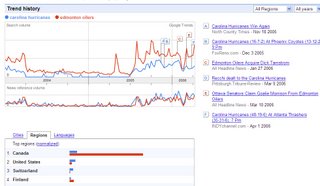I'm just back from a very interesting
Society for Scholarly Publishing Meeting in Arlington, VA. The meeting concentrated on the need for scholarly publishers to adapt to new developments on the Web and to changes in reader expectations. Of particular focus was the Open Access movement, the impact of new search technologies, the rise of institutional repositories and the need for journals to foster "community." A quick summary of the highlights...
Keynote speaker
Marshall Keys discussed the aspects of scholarly journals that need to be modernized to survive in the current world--a world far different than the one for which traditional scholarly journals were created. As one example of the how libraries and scholarly journals need to evolve to meet the needs of the modern reader, he suggested online journals should be formatted to be easily read on handheld devices. To survive, he argues, journals will facilitate discovery, will be portable and convenient, will tell the reader what other readers are looking at and will facilitate community. Keys spoke from the library perspective, which made the speech especially interesting to me. He made clear that scholarly publishers and libraries should work closely together--they are in the same boat in many ways and their end goals are the same.
David Meerman Scott, an expert in online marketing, stressed the need to tailor marketing strategies for the online environment. A successful campaign on the Web can be worth millions of dollars of traditional marketing. Establishing a journal blog, he points out, is essentuial if for no other reason than to increase the likelihood of search engine hits. (Check.) And for subscription journals, one of the best ways to gain paying readers is to offer at least some free content.
Geoffrey Bilder, from
Scholarly Information Services, and
Roy Tennant, from the University of California's
California Digital Library (and owner of the
Web4Lib list), emphasized the importance of developing journal websites that take into account the fact that most readers enter the site at the article level through a google or yahoo search, not through the homepage. All the bells and whistles in which journals invest time, money and energy are often completely bypassed. Tennant stressed the need to have an online journal that enables "ubiquitous discovery," and he spoke for the need for publishers and librarians to further develop and implement protocols like
OpenURL and
OAI-PMH. Bilder used the metaphor that journals should invest in building the "tunnels under Disneyland" rather than the "Disneyland Experience" itself. First and foremost, readers want convenience; they do not, Bilder stressed, want to make decisions.
Steve Borostyan, of
Public Library of Science, Abel Packer of
Scientific Electronic Library Online (SciELO), and Martin Richardson, of
Oxford University Press, discussed the various
Open Access options available to scholarly publishers. There are more OA models than I had realized, with variations on each model. Some journals now allow authors to purchase Open Access rights as an extra option (in the example Richardson gave, the cost to the author was $1500/$2800 depending on whether the affiliated institution held a subscription)-- the benefit being greater potential for impact. In a sponsored OA model, a sponsor covers the cost of publishing so submissions are free for authors (this is the model LSJ uses). The most prevalent model seems to be the Full OA model, in which authors are charged a set fee per submission (in Richardson's example, the fee was $1900 and 54% of authors paid this fee from research grant funds). There is generally a fee waiver option for authors not able to afford the fee, but according to Borostyan, in his experience 95% pay the fee (Richardson seconded this figure). One attendee noted in the questions and answer period that in her experience the percentage of authors claiming the waiver goes steadily up over time so it becomes increasingly important to develop strict standards regarding the waiver. It was nice to get some specific dollar figures from other journal--I never realized the cost to authors was so high in the non-sponsored journals.
Microsoft had a big presence at the meeting, offering free specialty coffee to attendees and rather nice Nalgene water bottles in promotion of its
Windows Livesearch to compete with Google Scholar. The consensus inside the seminar rooms, however, seemed to be rather anti-Windows-and-Google. One attendee spoke out against the willingness of some to compromise their journals in order to adapt them specifically for Google searching and against Microsoft's seeming need to challenge everything Google does with its own version (he was not swayed, apparently, by the Microsoft coffee bar at which I saw him queuing no less than five times in two days). Perhaps "anti" isn't the right word--let's say there is a reluctant acceptance that Google, et al. are now a big part of the sholarly communiciation process so we'd better adapt to it.
Many thanks to the SSP for the travel grant! It was great to meet other librarians and publishers, and get some practical advice as we get our little journal going here. And nice to meet
Von from the
LSJ editorial board--he's in Baltimore now
blogging the SLA conference if anyone wants the inside scoop on the happenings there.


